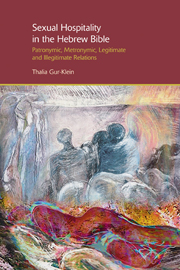 Sexual Hospitality in the Hebrew Bible
Sexual Hospitality in the Hebrew Bible Approaching the story of Ruth, I aspire to put forward the perspectives of its contemporary spirit, characters and circumstances, hoping to avoid propensities of a woman of my time. Superimposing contemporary values on ancient societies without understanding their perspectives would create the impression that ancient societies were less intelligent because they did not drive cars or were less aware of cruelty, atrocities or moral and societal issues than our society, using swords instead of smart bombs. Our ancestors seem morally deeply in touch with the physical reality of hunger and blood spilling. We have turned widows into cases of registration, and a victim into a moving shadow or a picture on a screen: a representation that supplants the real subject of killing, separating the experience of atrocity from its moral consequences; making the distance between the victim and the victimizer unbridgeable.
In the following, I shall be looking into the story of Ruth from its contemporary perspectives of kin relations, widow's marriage and land. The Book of Ruth revolves around two widows deprived of natal kinsmen, offspring and land. Stretched over a mere four chapters, the story opens with a spell of famine in Bethlehem and a natal household forced to leave for a foreign country, Moab: ‘Now it came to pass in the days when the judges ruled, that there was a famine in the land.
To save this book to your Kindle, first ensure [email protected] is added to your Approved Personal Document E-mail List under your Personal Document Settings on the Manage Your Content and Devices page of your Amazon account. Then enter the ‘name’ part of your Kindle email address below. Find out more about saving to your Kindle.
Note you can select to save to either the @free.kindle.com or @kindle.com variations. ‘@free.kindle.com’ emails are free but can only be saved to your device when it is connected to wi-fi. ‘@kindle.com’ emails can be delivered even when you are not connected to wi-fi, but note that service fees apply.
Find out more about the Kindle Personal Document Service.
To save content items to your account, please confirm that you agree to abide by our usage policies. If this is the first time you use this feature, you will be asked to authorise Cambridge Core to connect with your account. Find out more about saving content to Dropbox.
To save content items to your account, please confirm that you agree to abide by our usage policies. If this is the first time you use this feature, you will be asked to authorise Cambridge Core to connect with your account. Find out more about saving content to Google Drive.